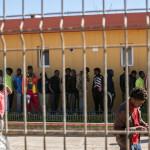
Spain has admitted it should not have fired rubber bullets at migrants trying to reach its North African territory last month.
Some 15 migrants drowned February 6 while they and hundreds of compatriots attempted to reach Ceuta from Morocco. The Spanish coast guard was criticised by the EU and rights groups who said the bullets could have played a role in the deaths.
At the time, interior minister, Jorge Fernandez Diaz, insisted that since the migrants had not been fired on directly, the rubber bullets could not have been responsible for the deaths. His recent admission that the action was ill-advised appears to be a concession to the EU stance. He also admits that rubber bullets were, in any case, unlikely to deter the sub-Saharan migrants.
Before Spain’s recent show of remorse, Jezerca Tigani, deputy director of Amnesty International’s Europe and Central Asia programme, said: “This loss of life is appalling, and the Spanish authorities must come clean on what happened – particularly as the minister’s version of events contradicts earlier official statements. They must determine what went wrong and bring those responsible to account as a matter of urgency.
“Regardless of whether any of the migrants were hit, it will be up to an independent investigation to determine whether the Civil Guard and border authorities acted appropriately. The results of any such investigation must be made public, and anyone responsible for human rights violations brought to justice.”
Together with Melilla, a second Spanish enclave, Ceuta is the European Union’s only land border with Africa. The two cities, both located on the Mediterranean coast at the northern tip of Morocco, have become a magnet for migrants trying to get to Europe.
The latest attempt by migrants to force their way into Spanish territory came at the weekend, when about 150 people tried to break into Melilla. Local police said it was the second attempt in less than 24 hours and 15 made it into the city before being arrested.









